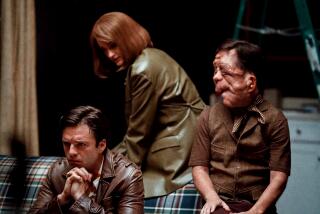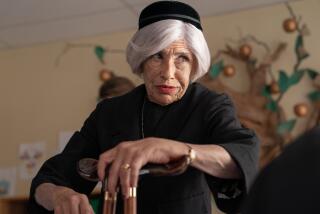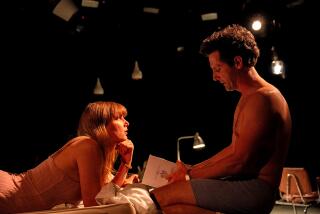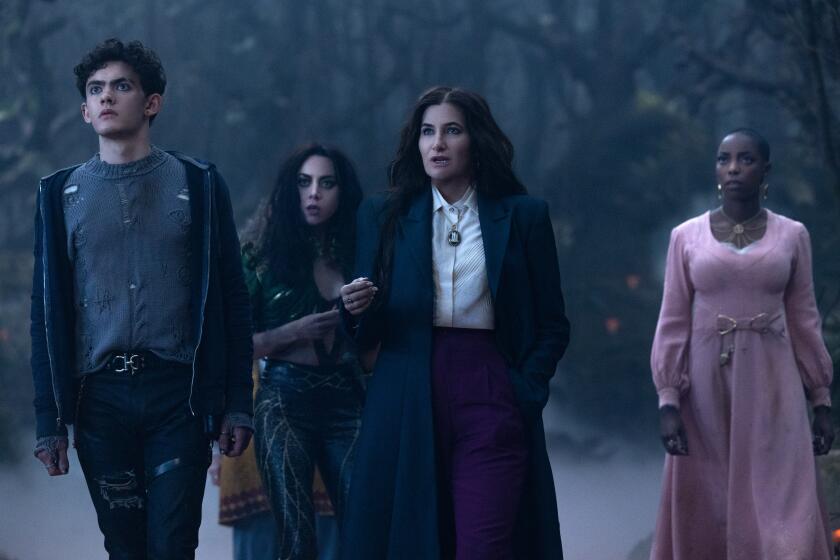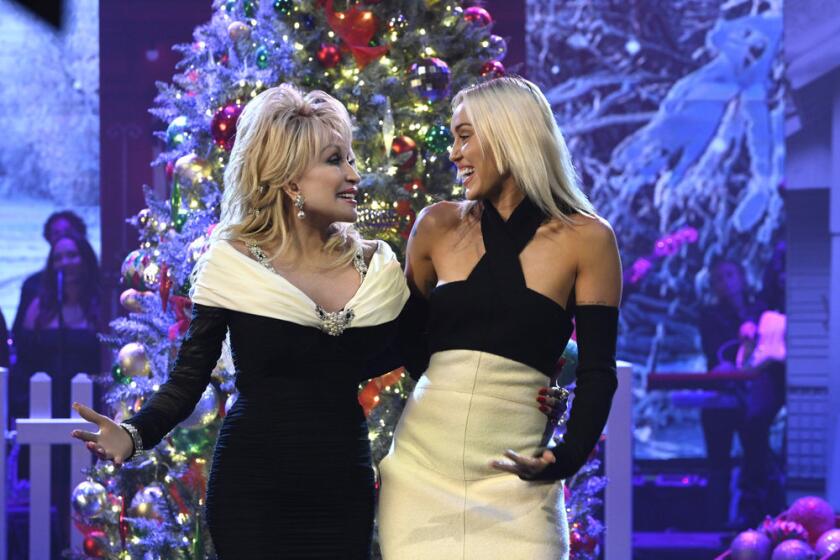Review: Despite star Laura Linney, ‘Switzerland’ an unconvincing stab at noir
Images of Patricia Highsmith in her later years suggest that Linda Hunt might be a suitable choice to take on the role of the author of “The Talented Mr. Ripley” and other savage tales of phony identity and insidious murder.
Laura Linney, even with her hair impressionistically streaked with gray, doesn’t remotely resemble Highsmith in her early 70s. Her casting is a hint that Australian playwright Joanna Murray-Smith is not aiming for realism in “Switzerland,” her shaky phantasmagoria about Highsmith at the end of her life.
The play, a two-hander commissioned by the Geffen Playhouse, where it is receiving its U.S. premiere after debuting at the Sydney Theatre Company, hews closely to the known biographical outline, but fiction stalks fact with the clumsy tread of a serial killer bound for the electric chair.
The action is set in Highsmith’s hideaway in the Locarno district of Switzerland in the mid-1990s. Highsmith, an irascible and deeply bigoted alcoholic, is presented in all her toxic eccentricity. She keeps snails as pets, collects antique guns and knives, and rants against Jews, Catholics, blacks and the American literary establishment that doesn’t sufficiently honor her (hence her residence in Europe, where she’s considered a great artist and not merely a superb crime writer).
The sinister comic plot Murray-Smith cooks up centers on a visit Highsmith receives from an ambitious underling at her New York publisher’s office. Edward (the outstanding Seth Numrich) has volunteered to make the trip even though the last assistant is still traumatized from his encounter with the author, who apparently put a knife to his throat while he was sleeping.
Edward is determined to persuade Highsmith to write one more installment of the Ripley series. He knows she’s ill (“Not quite on my deathbed ... but let’s just say it’s freshly made up,” she confirms), and he preys upon her ego and fixation on literary immortality.
Highsmith sees that he’s just another Vanity Fair-reading striver out for his own advancement, but she decides against throwing him out when she discovers that, like her character Tom Ripley, Edward was orphaned young and suffered a childhood as miserable as her own. Sentimentality isn’t driving her — she wants the gory details. She also wouldn’t mind help with this new Ripley caper.
Here’s where things get wobbly. As Highsmith and Edward begin mapping out this new tale, they themselves get caught up in a deadly cat-and-mouse game in which, in true Highsmith fashion, it’s not always clear who is the cat and who is the mouse. Murray-Smith seems to be aspiring toward something akin to what David Ives achieved in “Venus in Fur,” his two-hander in which an actress and a writer-director dangerously extend the S&M dynamic of their characters into the casting session.
But the terms of Murray-Smith’s drama are ultimately too capricious and unconvincing. What’s more, there doesn’t seem to be anything deeper going on than an homage to a certain psychological noir style. The playwright parrots her subject’s vitriol without ever finding her voice. This is a caricature of Highsmith that would rather grandly theatricalize her contrarian hatefulness than understand her as a tormented, bitterly contradictory yet fiendishly productive writer.
The production, directed by Mark Brokaw on a handsome set by Anthony T. Fanning that imagines the writer’s study against an Alpine backdrop, has trouble generating suspense out of this stagy situation. The stakes can’t rise when the reality is always shifting and in doubt.
Linney, one of the finest actors working today, is playing against type. Her unvarnished sincerity is of little use to her here, so she dives into the villainy with the relish of a Jacobean performer delighting the groundlings with macabre flourishes. Her portrayal, while acidly amusing in places, would benefit from more modulation. But the underlying problem is the play itself, which has a specious quality — the fatal flaw of this playwright’s work.
Murray-Smith has found an American home at the Geffen, where both “The Female of the Species” (starring Annette Bening) and “The Gift” (with Kathy Baker) were presented in productions that were superior to the writing. These works, like “Switzerland,” try to stay one step ahead of the audience by challenging received wisdom and laying down false leads. (Murray-Smith clearly loves to unsettle and discommode.)
But her plays — dark comedies that occasionally flirt with farce — have left me with the sense that there is something unsound about their basic architecture and dishonest about their polemical tactics. Shiny surfaces, manipulative plots, half-baked artistic intentions — with Murray-Smith nothing is ever what it seems, or entirely credible for that matter.
Yet she continues to draw first-rate American talent. Linney appeared in “Honour,” the Murray-Smith play that had a short run on Broadway in 1998 and was no doubt enticed by the opportunity to play such an unapologetic and enigmatic real-life baddie.
Numrich, a rising Broadway star (“War Horse,” Golden Boy”) is note perfect as the increasingly Ripley-like Edward. Some may quibble that he tosses his hair too much, but not me — this is the ‘90s, when flipping was mandatory. But something is sadly amiss when Linney and Numrich are starring in a new play and I’m devoting precious review space to the coiffure.
More to Read
The biggest entertainment stories
Get our big stories about Hollywood, film, television, music, arts, culture and more right in your inbox as soon as they publish.
You may occasionally receive promotional content from the Los Angeles Times.
